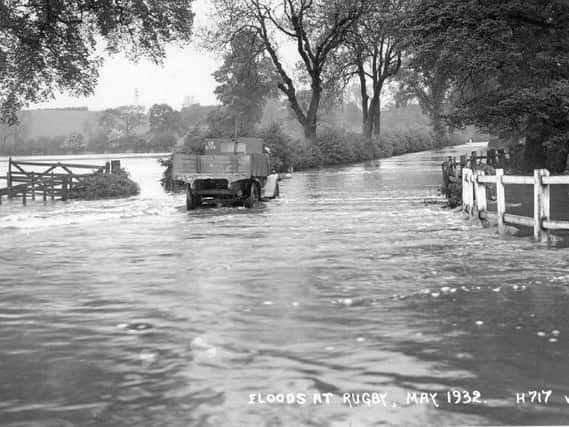Former Advertiser reporter remembers Rugby's floods of yesteryear - and the skating that came with it


The issues of global warming and the causes of climate change are never far from the news headlines these days.
This year has witnessed some truly catastrophic fires across southern Europe. And there have in recent years been a number of incidents in Britain, although of nothing like the same magnitude.
Advertisement
Hide AdAdvertisement
Hide AdAt the other end of the scale, there have been disastrous floods that have ravaged communities seemingly everywhere across the globe, leaving trails of misery and disruption in their wake.
But sometimes, it’s easy to forget that flooding is not a modern phenomenon, and the Rugby area is no exception, not having been spared numerous inundations down the years.
As many of us know, the River Avon and its various tributaries have always been prone to flooding. And some of my earliest childhood memories are of making the most of the situation whenever nearby farmland has been covered with the wet stuff.
The river that defined my boyhood days was, of course, the Swift. This little flow rises in Leicestershire, twisting and turning its way for roughly 14 miles before entering the Avon just north of the Eleven Arches.
Advertisement
Hide AdAdvertisement
Hide AdEvery winter during the 1950s, the Swift valley near my home in Churchover would become a vast inland lake, this watery panorama only being interrupted by hedges or lines of fencing and barbed wire, with the occasional tree standing lonely and marooned in the middle of a field.
Many small boys in those days possessed model yachts and the sudden appearance of those temporary oceans provided endless possibilities for sailing these little craft.
In the era when parental supervision was the exception rather than the rule it appears to be these days, countless happy hours would be spent wading in the shallow floodwater guiding a model yacht with the aid of a deftly handled bean cane.
This was required in order to turn the prow and thereby guide the yacht in the direction you roughly wanted it to go.
Advertisement
Hide AdAdvertisement
Hide AdWhen low pressure moved on, and the weather might suddenly turn colder, then – with a bit of luck aided by Jack Frost – these mighty expanses would freeze over, thereby providing opportunities of a different kind.
One of my earliest memories is of skating on a frozen pond at the back of Fred Green’s farm, together with other boys and girls from the village.
Nobody seemed to worry about falling through the ice, and when we’d all had enough of slipping, sliding and falling over, it was home to a tea of toast and beef dripping, with the whole lot plastered in enough salt and pepper to give a cardiac surgeon his very own coronary.
Yes, that’s right – the 1950s would have been the stuff of nervous breakdowns for your modern health and safety obsessive. Ah, but you knew that, I would imagine.
Advertisement
Hide AdAdvertisement
Hide AdSkating occurred whenever the water surface froze to around a minimum depth of roughly half an inch, preferably more. And weren’t we spoiled for choice? Yes, indeed.
There was a wide selection of places for people to enjoy themselves whenever the mercury plunged… the Oxford Canal, the Old Arm, the aforesaid Swift and Avon, and presumably the shallower, and therefore safer, areas of Newbold Quarry.
Elsewhere, our part of Warwickshire, being mainly arable in those days, was studded with ponds that provided drinking water for livestock. Many of these wildlife-rich pools were filled in during the late 1960s and 70s, as the county’s farmers adopted monoculture cropping with its prairie fields and the inevitable, ensuing loss of biodiversity.
I only fell through the ice once, suddenly finding myself up to the top of my chest with water that seemed to have arrived direct from the Arctic.
Advertisement
Hide AdAdvertisement
Hide AdThe strange thing was that after the initial, horrendous shock, the cold seemed positively bearable.
And once I’d gone home, dried off and put on a new set of clothes, my whole body would be tingling with warmth.
These days, the really cold winters seem to be a thing of past. Famous last words perhaps, as we can’t know what lies in store during the coming months.
And besides, would skating now be prevented in our modern over-cautious, neurotic society? I think it would.
Advertisement
Hide AdAdvertisement
Hide AdIn my adopted city of Worcester, the police quickly put a stop to anyone swimming in the River Severn, though not always without good reason.
So as usual, all that we older people are left with are our memories, recollections of all the fun we had when the world appeared to be a more relaxed place.
And we haven’t even started talking about all that toasted bread and beef dripping, have we? Anyway, get your skates on – or perhaps that should read ‘off’ - and bagsy the brown marrow at the bottom of the bowl…
John Phillpott’s book Beef Cubes and Burdock: Memories of a 1950s Country Childhood, is available from the usual outlets.